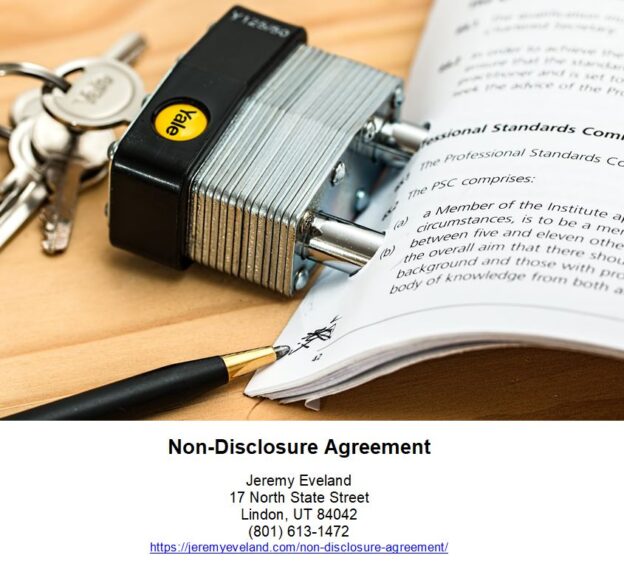Confidentiality agreements play a crucial role in protecting sensitive information in the business world. From safeguarding trade secrets and client data to maintaining a competitive edge, these agreements are essential in ensuring the confidentiality and security of valuable knowledge. In this article, we will explore the legality of confidentiality agreements, shedding light on their enforceability, potential limitations, and benefits. Whether you are a business owner seeking to protect your proprietary information or an individual looking to understand the implications of signing such an agreement, this article will provide you with comprehensive insights into the legal aspects of confidentiality agreements.
Introduction to Confidentiality Agreements
Confidentiality Agreements, also known as Non-Disclosure Agreements (NDAs), are legal contracts that protect sensitive information shared between parties. These agreements establish a confidential relationship, ensuring that the recipient of the information does not disclose or use it without the consent of the disclosing party. Confidentiality Agreements are widely used in various contexts, such as employment relationships, business transactions, and collaborations.
What are Confidentiality Agreements?
Confidentiality Agreements are legally binding contracts that outline the terms and conditions regarding the protection of confidential information. They are commonly used to safeguard trade secrets, proprietary data, client lists, and other valuable information that has commercial or strategic significance. These agreements ensure that both parties involved understand their obligations and responsibilities in maintaining confidentiality.
Importance of Confidentiality Agreements
Confidentiality Agreements play a crucial role in safeguarding sensitive information in today’s competitive business environment. By establishing clear guidelines on the use and disclosure of confidential information, these agreements help businesses maintain their competitive edge and protect their intellectual property. Confidentiality Agreements also foster trust between the parties involved and help prevent unauthorized disclosure, misuse, or theft of valuable information.
Types of Confidentiality Agreements
There are different types of Confidentiality Agreements tailored to specific needs and circumstances. The two primary types include:
-
Mutual Confidentiality Agreements: These agreements are used when confidential information is expected to be exchanged between both parties. Mutual Confidentiality Agreements ensure that both parties are bound by confidentiality obligations and provide protection for the disclosed information.
-
One-way Confidentiality Agreements: These agreements are used when only one party will disclose confidential information to the other. In this type of agreement, only the recipient party is bound by confidentiality obligations, while the disclosing party is not restricted from sharing or using the recipient’s information.
Enforceability of Confidentiality Agreements
To ensure the effectiveness of Confidentiality Agreements, certain requirements must be met. It is essential to establish enforceability to ensure that the agreement can be upheld in a court of law.
Basic Requirements for Enforceability
For a Confidentiality Agreement to be enforceable, it should meet the following basic requirements:
-
Offer and Acceptance: Both parties must enter into the agreement voluntarily and without any undue influence or coercion.
-
Consideration: The agreement must have valid consideration, which means that both parties are exchanging something of value to make the contract binding. This could be money, services, or access to confidential information.
-
Mutual Obligations: The agreement should clearly outline the obligations and responsibilities of both parties regarding the protection and use of confidential information.
-
Clarity and Certainty: The terms of the agreement must be clear, unambiguous, and easily understood by both parties. Ambiguities may lead to disputes or difficulties in enforcing the agreement.
-
Legality: The agreement should not involve any illegal activities or terms that may be against public policy. If an agreement is found to be unlawful, it may be deemed unenforceable.
Consideration in Confidentiality Agreements
Consideration refers to the benefit or detriment that each party receives as part of the agreement. In Confidentiality Agreements, consideration is often described as the exchange of confidential information from one party to another. However, it is important to note that consideration can take various forms, such as monetary compensation, goods or services, employment opportunities, or access to resources.
Mutual vs. One-way Confidentiality Agreements
When drafting a Confidentiality Agreement, parties must consider whether it will be mutual or one-way.
A mutual Confidentiality Agreement places confidentiality obligations on both parties, ensuring that the disclosing party’s information is also protected. On the other hand, a one-way Confidentiality Agreement only enforces confidentiality obligations on the receiving party, allowing the disclosing party to share information without similar restrictions.
The choice between mutual and one-way agreements depends on the specific circumstances and the parties’ goals. Mutual agreements provide a higher level of protection for both parties, while one-way agreements may be more suitable when one party holds significantly more confidential information than the other.
Clear and Unambiguous Terms
Clear and unambiguous terms are crucial in Confidentiality Agreements to ensure that the scope of protection and obligations of the parties are clearly defined. Ambiguous or vague language can lead to disputes and make it challenging to enforce the agreement in a court of law. It is essential to clearly define what constitutes confidential information and specify the circumstances under which disclosure is permitted, if any.
Potential Legal Challenges
Confidentiality Agreements, like any legal contract, can face potential legal challenges. Some common challenges include:
-
Lack of Consideration: If the agreement does not have a valid exchange of consideration, it may not be enforceable.
-
Unreasonable Restrictions: If the Confidentiality Agreement imposes unreasonable restrictions on the receiving party, it may be deemed unenforceable or require modification.
-
Violation of Public Policy: If the agreement contains terms that are against public policy, such as those limiting an employee’s ability to report illegal activities, it may be deemed unenforceable.
-
Breach of Contract: If one party fails to uphold their confidentiality obligations, the other party may seek legal remedies for breach of contract. However, proving a breach can be challenging and may require sufficient evidence.
-
Jurisdictional Differences: Confidentiality Agreements may face challenges in cross-border enforcement due to differences in laws and regulations. Parties should consider jurisdictional issues when drafting agreements involving international parties.
Key Elements of Confidentiality Agreements
To ensure the effectiveness of Confidentiality Agreements, several key elements should be included. These elements clarify the obligations and responsibilities of the parties involved and provide a solid foundation for protecting confidential information.
Definition of Confidential Information
Confidential Agreements should clearly define what constitutes confidential information. This definition typically includes trade secrets, proprietary information, client lists, financial data, manufacturing techniques, and any other information that is not public knowledge and may give a competitive advantage to the disclosing party.

Exclusions from Confidentiality
In some cases, certain information may be excluded from the scope of confidentiality. These exclusions should be clearly stated in the agreement. For example, information already in the public domain or information that the receiving party can prove was already known to them before entering into the agreement may not be subject to confidentiality obligations.
Obligations of the Parties
Confidentiality Agreements should outline the specific obligations and responsibilities of the parties involved regarding the protection and use of confidential information. This may include provisions on how the information should be stored, who can access it, and restrictions on its use, disclosure, or reproduction.
Duration of Confidentiality
The duration of confidentiality is an essential aspect of the agreement. It specifies how long the obligations to keep the information confidential will last. The duration can be a specific timeframe (e.g., five years) or contingent on certain events (e.g., until a product launch). The chosen duration should align with the needs of the parties and the nature of the confidential information.
Remedies for Breach
Confidentiality Agreements should establish the remedies available to the disclosing party in case of a breach. Remedies may include monetary damages, injunctive relief (e.g., court orders preventing further disclosure), and attorneys’ fees. Clear provisions regarding the consequences of a breach can serve as a deterrent and provide a means to seek legal recourse if necessary.
Severability Clause
A severability clause is a valuable provision that safeguards the enforceability of the Confidentiality Agreement. This clause states that if any provision of the agreement is found to be unenforceable, it will not affect the validity of the other provisions. This ensures that if one part of the agreement is deemed unenforceable, the rest of the agreement remains intact.
Negotiating and Drafting Confidentiality Agreements
Negotiating and drafting Confidentiality Agreements require careful consideration of various factors to create a comprehensive and effective agreement that meets the needs of the parties involved.
Identifying the Parties
The agreement should clearly identify the parties and their respective roles. This ensures that the obligations and rights are properly assigned to the correct entities and avoids potential confusion or disputes.
Scope of Confidential Information
It is essential to clearly define the scope of confidential information that will be protected by the agreement. This includes specifying the types of information to be disclosed, the purpose of disclosure, and any limitations or exceptions.
Third-Party Involvement
If third parties will have access to the confidential information, such as contractors, consultants, or employees, it is important to address their obligations and responsibilities in the agreement. This may include provisions for the use of subcontractors, non-disclosure requirements, and appropriate safeguards to protect the information.
Non-compete and Non-solicitation Clauses
Confidentiality Agreements may include non-compete and non-solicitation clauses to prevent the receiving party from directly competing with the disclosing party or soliciting their clients or employees. These clauses should be carefully drafted to ensure they are reasonable, enforceable, and compliant with applicable laws.

Addressing Exceptions and Disclosures
The agreement should clearly state any exceptions to confidentiality obligations or circumstances under which disclosure may be required. For example, if disclosure is required by law or if the information becomes public knowledge through no fault of the receiving party, such exceptions should be explicitly addressed.
Review by Legal Counsel
To ensure the fairness and legality of the agreement, it is advisable to have the Confidentiality Agreement reviewed by legal counsel. Professional legal advice can help identify any potential issues, clarify ambiguous language, and ensure compliance with applicable laws and regulations.
Enforcing Confidentiality Agreements
Enforcing Confidentiality Agreements requires taking appropriate steps when a breach occurs, resolving disputes, and seeking legal remedies when necessary.
Proving Breach of Confidentiality
To prove a breach of confidentiality, the party alleging the breach must demonstrate that there was a valid Confidentiality Agreement in place, that the information shared was confidential, and that the receiving party disclosed or used the information in violation of the agreement. Documentary evidence, witness testimonies, and expert opinions may be used to support the claim.
Resolving Disputes
In the event of a dispute arising from a breach of confidentiality, parties can attempt to resolve the issue through negotiation, mediation, or arbitration. These alternative dispute resolution methods can help avoid costly and time-consuming litigation and provide a more efficient means of resolving conflicts.
Damages and Injunctive Relief
If a breach is proven, the disclosing party may be entitled to damages for any losses suffered as a result of the breach. These damages can include actual financial losses, lost profits, or reputational damage. Injunctive relief, such as a court order to cease further disclosure, may also be sought to prevent ongoing harm or mitigate potential damages.
Statute of Limitations
Claims for breach of confidentiality are subject to a statute of limitations, which specifies the time within which a legal action must be initiated. The length of the statute of limitations varies depending on the jurisdiction and the applicable laws. Parties must be aware of the applicable statute of limitations to ensure timely enforcement of their rights.
Jurisdiction and Governing Law
Confidentiality Agreements should include provisions specifying the jurisdiction and governing law applicable to the agreement. This helps determine which court or legal system will have authority in case of a dispute and ensures clarity and consistency in interpreting and enforcing the agreement.
Enforcement Challenges
Enforcing Confidentiality Agreements can sometimes pose challenges, particularly in cross-border situations. Differences in legal systems, jurisdictional issues, language barriers, and cultural factors can complicate the enforcement process. When dealing with international parties, it is crucial to consider these challenges and seek appropriate legal advice to ensure the enforceability of the agreement.
International Considerations
Confidentiality Agreements involving international parties require careful consideration of jurisdictional differences, cross-border enforcement, local language, and cultural factors.
Jurisdictional Differences
When parties from different jurisdictions enter into a Confidentiality Agreement, jurisdictional differences can affect the enforceability and interpretation of the agreement. It is vital to consider the laws and regulations of each jurisdiction involved and draft the agreement accordingly.
Cross-border Enforcement
Enforcing Confidentiality Agreements across borders can be complex due to differences in legal systems, international treaties, and the recognition of foreign judgments. Parties should seek legal advice to understand the specific requirements and challenges associated with cross-border enforcement.
Local Language and Cultural Factors
Confidentiality Agreements involving international parties may require translation into the local language to ensure understanding and enforceability. Cultural factors can also influence the interpretation of certain terms or obligations, highlighting the importance of considering these factors during the drafting process.
International Confidentiality Standards
Confidentiality Agreements may need to comply with international confidentiality standards, such as the EU General Data Protection Regulation (GDPR) or industry-specific regulations. Understanding and adhering to these standards is essential for international agreements to ensure compliance and protection of confidential information.
Confidentiality Agreements in Employment Relationships
Confidentiality Agreements are frequently used in employment relationships to protect a company’s confidential information and trade secrets. These agreements establish the obligations of employees regarding the use and disclosure of sensitive information.
Confidentiality Obligations of Employees
Confidentiality Agreements in the context of employment establish the obligations of employees to maintain the confidentiality of the company’s trade secrets and proprietary information. Employees are required to refrain from disclosing or using confidential information for personal gain or to the detriment of the company.
Trade Secrets and Intellectual Property
Confidentiality Agreements play a vital role in protecting a company’s trade secrets and intellectual property. Trade secrets, such as manufacturing processes, formulas, or customer lists, are valuable assets that can provide a competitive advantage. By outlining the obligations and restrictions regarding trade secret protection, Confidentiality Agreements ensure that employees understand their responsibilities in safeguarding this information.
Non-disclosure Agreements
Non-disclosure Agreements (NDAs) are a type of Confidentiality Agreement commonly used in employment relationships. NDAs establish the obligations of employees not to disclose or use confidential information during or after their employment. These agreements are essential when employees have access to sensitive information that must be kept confidential to protect the company’s interests.
Potential Liability for Breach
Employees who breach a Confidentiality Agreement may be subject to various liabilities, including legal actions and potential financial damages. Employers can seek remedies for breach of contract and may also have additional legal rights, such as pursuing injunctive relief to prevent further disclosure or use of confidential information.
Restrictive Covenants and Non-compete Clause
Confidentiality Agreements in employment relationships can include restrictive covenants, such as non-compete or non-solicitation clauses. Non-compete clauses restrict employees from working for a competitor or starting a competing business for a specified period within a certain geographical area. Non-solicitation clauses restrict employees from soliciting clients, customers, or other employees of the company for a set duration.
Effective Employee Training
To enforce Confidentiality Agreements effectively, it is crucial to provide comprehensive training to employees regarding their obligations and responsibilities. Employee training programs should educate employees on the importance of maintaining confidentiality, the types of information that must be protected, and the consequences of breaching the agreement. Regular training sessions can help reinforce the importance of confidentiality and ensure compliance with the agreement’s terms.
Confidentiality Agreements in Business Transactions
Confidentiality Agreements are essential in various business transactions to protect sensitive information during negotiations and collaborations. These agreements ensure that both parties involved in the transaction maintain confidentiality to prevent unauthorized disclosure or misuse of valuable information.

Mergers and Acquisitions
In mergers and acquisitions, Confidentiality Agreements are crucial in protecting the sensitive financial, operational, and strategic information exchanged between the parties. These agreements restrict the use and disclosure of the information, ensuring that it remains confidential throughout the transaction process.
Joint Ventures and Collaborations
Confidentiality Agreements are often used in joint ventures and collaborations to protect the parties’ confidential information shared during the partnership. These agreements establish the parameters for confidentiality and ensure that both parties are bound by obligations to safeguard shared information from disclosure to third parties.
License Agreements
License Agreements involve the granting of rights to use intellectual property or proprietary information. Confidentiality Agreements in license agreements protect the licensor’s confidential information and trade secrets related to the licensed technology, process, or intellectual property. These agreements prevent the licensee from disclosing or using the confidential information for purposes other than those specified in the agreement.
Supplier and Vendor Contracts
Confidentiality Agreements are important in supplier and vendor contracts, particularly when the supplier or vendor has access to sensitive information about the business operations, processes, or trade secrets. These agreements ensure that the supplier or vendor maintains the confidentiality of the information and does not disclose it to competitors or use it for unauthorized purposes.
Protecting Customer Information
Confidentiality Agreements play a critical role in protecting customer information obtained during business transactions. These agreements ensure that the collected customer data remains confidential and is not shared or used for any purpose other than the intended transaction.
Confidentiality Agreements in Due Diligence
During due diligence processes, Confidentiality Agreements are essential in protecting the disclosing party’s sensitive financial, operational, and strategic information. These agreements ensure that potential buyers, investors, or partners maintain the confidentiality of the disclosed information during their evaluation and analysis.
Confidentiality Agreements with Contractors and Consultants
Confidentiality Agreements are commonly used with contractors and consultants who work closely with businesses and have access to sensitive information. These agreements ensure that the contractors and consultants maintain the confidentiality of the information shared and do not disclose or use it for unauthorized purposes.
Outsourcing and Independent Contractors
When outsourcing business functions or working with independent contractors, Confidentiality Agreements are necessary to protect the company’s sensitive information. These agreements establish the obligations of the contractors to maintain the confidentiality of the information and restrict its use to the specific purposes outlined in the agreement.
Freelancers and Temporary Staff
Freelancers and temporary staff may have access to confidential information during their engagement with a company. Confidentiality Agreements ensure that these individuals understand their responsibilities and obligations to protect the company’s sensitive information and not disclose or use it for personal gain or to the detriment of the company.
Non-disclosure and Confidentiality Clauses
Confidentiality Agreements with contractors and consultants typically include non-disclosure and confidentiality clauses. These clauses explicitly outline the obligations and responsibilities of the contractors or consultants to maintain the confidentiality of the information shared during the engagement.
Ownership of Intellectual Property
In Confidentiality Agreements with contractors and consultants, it is important to address the ownership of intellectual property. The agreement should specify whether any intellectual property created or developed by the contractors or consultants during the engagement will be owned by the company or the contractor/consultant.
Enforcing Confidentiality with Third Parties
Enforcing Confidentiality Agreements with contractors and consultants requires monitoring and oversight. Regular communication and supervision can help ensure compliance with the agreement’s terms and provide an opportunity to address any potential breaches promptly.
Termination of Confidentiality Obligations
Confidentiality Agreements should specify the termination or expiration of confidentiality obligations. When the engagement with contractors or consultants ends, the agreement should outline the duration for which confidentiality obligations continue or whether they terminate immediately.
FAQs about Confidentiality Agreements Legality
Are Confidentiality Agreements legally binding?
Yes, Confidentiality Agreements are legally binding contracts. They outline the obligations, responsibilities, and restrictions regarding the protection and use of confidential information. To be enforceable, Confidentiality Agreements must meet certain requirements, including valid consideration, mutual obligations, clear terms, and compliance with applicable laws.
What happens if someone breaches a Confidentiality Agreement?
If someone breaches a Confidentiality Agreement, the aggrieved party may seek legal remedies. These remedies may include monetary damages for any losses suffered as a result of the breach or injunctive relief, such as court orders to prevent further disclosure or use of the confidential information. The specific consequences of breaching a Confidentiality Agreement depend on the terms of the agreement and applicable laws.
Can a Confidentiality Agreement be enforced internationally?
Enforcing a Confidentiality Agreement internationally can be challenging due to differences in legal systems, jurisdictional issues, and the recognition of foreign judgments. However, there are mechanisms and treaties in place to facilitate cross-border enforcement. Parties should seek legal advice and ensure that the agreement includes provisions regarding jurisdiction, governing law, and dispute resolution methods to address international enforceability concerns.
What should be included in a Confidentiality Agreement?
A comprehensive Confidentiality Agreement should include the following key elements: definition of confidential information, exclusions from confidentiality, obligations of the parties, duration of confidentiality, remedies for breach, and a severability clause. Additionally, the agreement should address specific considerations based on the context, such as jurisdictional differences, non-disclosure obligations of employees, non-compete clauses, or intellectual property ownership.
Can an employer terminate an employee for breaching a Confidentiality Agreement?
Depending on the terms of the employment contract and the applicable laws, an employer may have the right to terminate an employee for breaching a Confidentiality Agreement. Breaching a Confidentiality Agreement can be seen as a breach of the employment contract, which may provide grounds for termination. However, employers should seek legal advice and follow proper procedures when considering termination to ensure compliance with applicable laws and avoid potential legal disputes.




